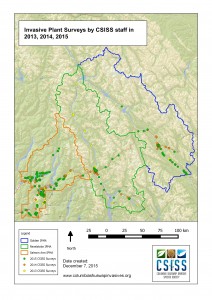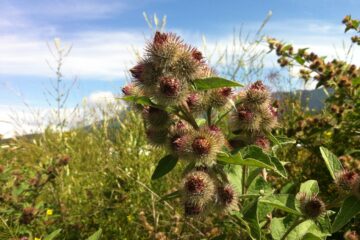For the full report with photos, maps and descriptions of our 2015 programs please click here.
EXECUTIVE SUMMARY
April 2015 marked the start of the third operational season of the Columbia Shuswap Invasive Species Society (CSISS). Since its
inception, the Society has actively pursued the goals identified in the 2013 CSISS Strategic Plan:
- Implement a collaborative and coordinated program
- Educate, engage and inspire residents and others to participate in invasive plant management
- Prevent the introduction of new invasive species
- Maximize the probability of detection and eradication of new invasive species
- Slow or reverse the spread of existing invasive species and reduce their harmful impacts
- Ensure program sustainability
In 2015, the CSISS strengthened and expanded its network of partners and furthered its objective to deliver collaborative and coordinated programs in the CSRD. This was achieved through its partnerships with various levels of government, the Invasive Species Council of BC, other regional invasive species groups, local stakeholders, residents and NGOs. Over 47 new and existing partnerships were established and strengthened.
Educating and engaging local residents continued to be a priority in 2015. The CSISS presented to and conducted targeted outreach to various stakeholders, landowners and First Nations. Additionally, the CSISS has supported numerous community events, hosted training workshops, re-designed and replaced outreach materials and banners, and engaged youth across the region through presentations and outdoor-based learning. Through these outreach activities, the CSISS directly engaged with over 2,960 people in the region, 986 of them youth.
The CSISS approached 18 garden centres and nurseries and presented the “PlantWise” message to various target groups to prevent new invasives from establishing in the region. CSISS staff also actively participated in the “Clean-Drain-Dry” Program, spreading the message to youth, local residents, water stewardship and boating groups to help prevent aquatic invaders such as Zebra/Quagga Mussels. Since January 2015, the CSISS was mentioned in 28 local news, radio and web pieces. Outreach through social media was also emphasized with an average of 1-2 posts per week on Facebooks and 127 ‘likes’ on the CSISS page. Through this media coverage the CSISS raised awareness of invasives and the importance of prevention activities.
In 2015, the CSISS hired an AIS contractor, Chris Harkness to inventory critical and high priority water bodies for aquatic invasive plants and Zebra/ Quagga mussel veligers to maximize the probability of detection and eradication of invasives. CSISS staff also targeted areas across the region for terrestrial invasive plant surveys, greatly enhancing our knowledge of the distribution and abundance of various high priority species in the region.
CSISS staff worked with key partners to slow and reverse the spread of invasive species. The CSISS hosted an Industrial Vegetation and Noxious Weed Applicator course in 2015 to train staff and build capacity among program partners. To enhance coordinated control efforts, CSISS staff collaborated with various land managers to ensure accurate, up-to date priority plant targets for active control. During the 2015 field season, CSISS staff documented and entered over 382 invasive plant records into IAPP. Over 78 volunteers participated in 6 weed pulls across the region, pulling over 125 bags of weeds!
In 2015, the CSISS employed 4 staff, 1 AIS contractor and added nearly $50,000 to its operating budget. Increasing in-house capacity and entering into multi-year funding agreements enhanced the overall program sustainability. Thanks to dedicated staff, diligent Directors, knowledgeable partners and inspired volunteers, the CSISS expanded its programming and made significant progress on each goal identified in the 2013 CSISS Strategic Plan.
Any questions or comments? Email us at info@columbiashuswapinvasives.org



